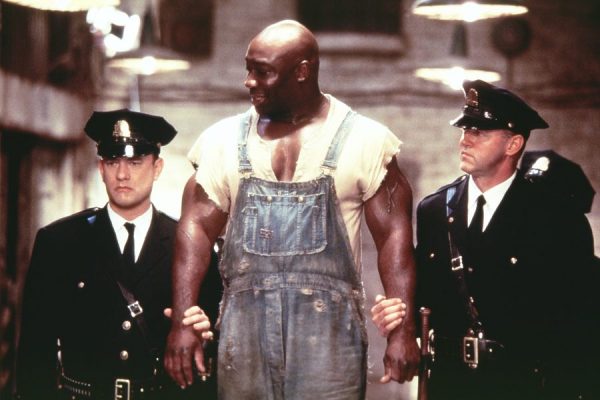The Green Mile Review
It’s hard to include this review in this Tom Hanks appreciation series, because I didn’t write about Hanks’ performance, but the rest of the pickings include reviews that were very short and admittedly weak (and also didn’t mention Hanks’ performance). Anyway, “The Green Mile” is a great movie! This review is from July 17, 2010.
If given the choice, I don’t think many filmmakers would choose prison dramas as their area of expertise, but Frank Darabont seems to have no problem with it and neither should we; he has directed arguably the two greatest prison films ever made in his highly selective career. Both “The Shawshank Redemption” and “The Green Mile” are weighty but moving period pieces with impeccable characters and an epic quality considering the literal confines of the story. “The Green Mile” puts a supernatural twist on the genre and though it lacks the inspirational kick that allowed “Shawshank” to win the hearts of nearly all who’ve seen it, it holds its own among the many great dramas of the 1990s.
Based on the Stephen King novel, “The Green Mile” is a Depression-era film that takes place in a Southern prison on the cell block that houses the criminals awaiting death and “Old Sparky” (the electric chair). The ensemble consists of a few of these prisoners and the guards that watch them, led by Paul Edgecomb (Tom Hanks). The story is partially narrated by the elder version of Edgecomb as he reflects on the strange and life-changing events that occurred in that prison when a large man with mysterious healing abilities named John Coffey (Michael Clarke Duncan) arrived.
Darabont’s adaptation is meaty with smooth and effective story arcs and full-bodied characters who feel 100 percent authentic. Just like in “Shawshank,” Darabont separates the good guys from the bad guys quickly and they tug at our emotions right away. Doug Hutchison plays the mean-spirited and snotty Percy Wetmore, the one prison guard who’s aunt is the governor’s wife and tries to use that privilege to behave however he likes. All the other guards (a strong ensemble cast including David Morse and Barry Pepper) treat the prisoners with some humanity, but Percy treats them as if they’re the scum of the earth, which easily rattles us.
Darabont asks for a small leap of faith in that we’re supposed to pity the prisoners, but considering the flaws of the criminal justice system at the time and excessive and unnecessary use of the death penalty, this is not too difficult. In general, Darabont has the uncanny ability to influence his audience and it’s everywhere in “The Green Mile,” namely with characters. The introduction of Sam Rockwell’s “Wild Bill” to the prison is the finest example. He acts catatonic until he gets to the prison and then attacks the guards. From there on out, his subplot is a roller coaster. When he finally gets what he deserves (solitary confinement a couple times) its cathartic for the viewer, but then he’s right back at his usual hi-jinx.
Character mastery is the strength of the film, but its weakness is the supernatural element. Considering it takes a long while to enter the picture and everything else feels like authentic historical fiction, John Coffey’s healing abilities feel out of place even though they drive the latter half of the film. They’re intriguing and add a layer of mystery that certainly complicates matters and when it’s used it usually has an impact on the more powerful events of the story (one involving a wonderful little mouse named Mr. Jangles). Yet there’s still a continuity issue that just kind of snaps the illusion of the film for a brief moment.
“The Green Mile” is often considered one of the greatest “tearjerkers” of all-time and it certainly warrants that notion whether you cry or not. Rarely does a film pull at your insides like this one, just as it did with “Shawshank,” and rarely does a three-hour movie manage to never get boring or talk-heavy. Darabont’s excellent script carefully places the turning points of the story to ensure just that.
Here is a film that will radically influence your perceptions of justice. The line between good and evil in this movie is so thick as if suggesting for every definitive good there is in this world there is its equal. Normally we’re introduced in film to characters who suggest every person has the capacity for both, but “The Green Mile” argues that’s not always the case. “The Green Mile,” which refers to the green floor of the cell block, symbolizes the path before one is ultimately judged as being one or the other. A tough idea, a powerful idea and one that suits the weighty impact of this film.
4.5/5 Stars
The Green Mile
Directed by Frank Darabont
Written by Frank Darabont, Stephen King (novel)
Starring: Tom Hanks, Michael Clarke Duncan, David Morse, Barry Pepper





0 Comments
You can be the first one to leave a comment.